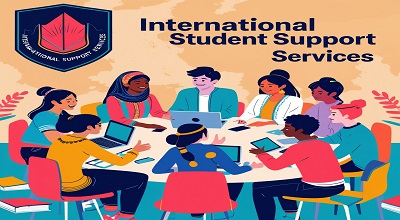International Student Support Services
International Student Support Services: The number of international students pursuing higher education abroad has been steadily increasing over the years. According to UNESCO, over 6 million students study outside their home countries, with the U.S., U.K., Australia, Canada, and Germany being the top destinations.
However, transitioning to a new country comes with challenges, including cultural differences, language barriers, academic adjustments, and financial constraints. To address these issues, universities and colleges worldwide offer International Student Support Services (ISSS). These services aim to help students adapt, succeed academically, and integrate socially.
Why International Student Support Services Are Important?
International students contribute significantly to the economy and cultural diversity of host countries. However, they often face:
- Cultural Shock – Adjusting to new social norms.
- Language Barriers – Difficulty in academic and social communication.
- Homesickness – Emotional and mental health struggles.
- Financial Stress – Managing tuition, living costs, and part-time work.
- Visa and Legal Concerns – Understanding immigration policies.
Proper support services ensure students have a smooth transition, reducing dropout rates and enhancing their overall experience.
Types of International Student Support Services
A. Pre-Arrival Support
Many institutions assist students before they even arrive, offering:
- Visa guidance (e.g., document checklists, application assistance).
- Accommodation assistance (on-campus housing, homestays).
- Pre-departure webinars (cultural expectations, packing tips).
Example: The University of Sydney provides a “Pre-Departure Guide” with checklists, airport pickup services, and orientation schedules.
B. Academic Support
- Tutoring and Writing Centers – Help with assignments and research.
- Study Skills Workshops – Time management, exam preparation.
- Academic Advisors – Guidance on course selection and degree planning.
Example: MIT’s “International Students Office” offers academic counseling and peer mentoring.
C. Financial Support
- Scholarships & Grants – Merit-based and need-based aid.
- Part-Time Job Assistance – On-campus employment opportunities.
- Budgeting Workshops – Managing expenses effectively.
Example: The UK’s Chevening Scholarships cover tuition, living costs, and travel for international students.
D. Mental Health and Wellbeing Support
- Counseling Services – Stress, anxiety, and depression support.
- Peer Support Groups – Connecting with fellow international students.
- Wellness Programs – Yoga, meditation, and fitness classes.
Example: The University of Toronto offers “My Student Support Program (MySSP)”, providing 24/7 mental health counseling in multiple languages.
E. Career and Employment Support
- Resume & Interview Workshops – Job search strategies.
- Internship Placements – Industry connections.
- Post-Study Work Visa Guidance – Understanding work rights.
Example: Australia’s “CareerHub” by the University of Melbourne helps students find internships and graduate jobs.
F. Cultural and Social Integration Support
- Buddy Programs – Pairing new students with seniors.
- Cultural Festivals & Clubs – Celebrating diversity.
- Orientation Weeks – Campus tours and social events.
Example: The “Global Ambassador Program” at Harvard connects international students with local mentors.
G. Language and Communication Support
- ESL (English as a Second Language) Courses
- Conversation Clubs – Practicing language skills.
- Translation Services – For academic and legal documents.
Example: The “Language Centre” at the University of Oxford offers specialized English courses for non-native speakers.
H. Legal and Visa Support
- Immigration Workshops – Visa renewals, work permits.
- Legal Aid Clinics – Addressing residency issues.
Example: Canada’s “International Student Advising” at UBC helps with study permits and post-graduation work permits.
Examples of International Student Support Services Worldwide
A. United States
- University of California, Los Angeles (UCLA) – Offers “Dashew Center” for visa advice, cultural events, and emergency support.
- New York University (NYU) – Provides “Global Peer Mentors” to help new students adjust.
B. United Kingdom
- University of Manchester – Runs “Global Buddies” for social integration.
- Imperial College London – Offers “International Student Support Team” for visa and financial guidance.
C. Australia
- University of Melbourne – “Stop 1” service for academic, career, and wellbeing support.
- University of Sydney – “International Student Support Unit” for legal and emergency assistance.
D. Canada
- University of Toronto – “Centre for International Experience” for mentorship and workshops.
- University of British Columbia (UBC) – “International Student Advising” for visa and work permit help.
E. Germany
- Technical University of Munich – “TUM International Center” for housing and language courses.
- Freie Universität Berlin – “Welcome Program” for orientation and networking.
F. Japan
- University of Tokyo – “International Support Office” for academic and daily life assistance.
- Waseda University – “International Community Center” for cultural exchange programs.
Challenges Faced by International Students
Despite support services, students still encounter:
- Discrimination & Racism
- High Tuition & Living Costs
- Work Restrictions (limited part-time hours)
- Social Isolation
How Institutions Can Improve Support Services?
- Increase Funding for scholarships and mental health programs.
- Enhance Cultural Sensitivity Training for staff and local students.
- Expand Digital Support (AI chatbots, virtual counseling).
Technology in Enhancing Student Support Services
- AI Chatbots (e.g., Deakin University’s “Genie”)
- Virtual Counseling Platforms
- Mobile Apps for Campus Navigation
Future Trends in International Student Support
- Hybrid Support Models (Online + In-Person)
- Personalized AI Mentoring
- Increased Focus on Mental Health
Conclusion
International student support services are crucial for ensuring academic success, mental wellbeing, and cultural integration. Universities must continue improving these services to meet evolving student needs.
FAQs
Q1: What are the most common support services for international students?
A: Academic advising, visa assistance, mental health counseling, career services, and language support.
Q2: How can international students access mental health support?
A: Through university counseling centers, hotlines (e.g., MySSP in Canada), and peer support groups.
Q3: Do all universities offer scholarships for international students?
A: No, but many provide merit-based and need-based scholarships. Always check the university’s financial aid page.
Q4: What should international students do if they face discrimination?
A: Report to the university’s diversity office, seek legal advice, or contact student unions for support.
Q5: How can technology improve student support services?
A: AI chatbots, virtual counseling, and mobile apps streamline access to resources and provide instant assistance.
Download Free: OnePlus Store 3.0.3.1
